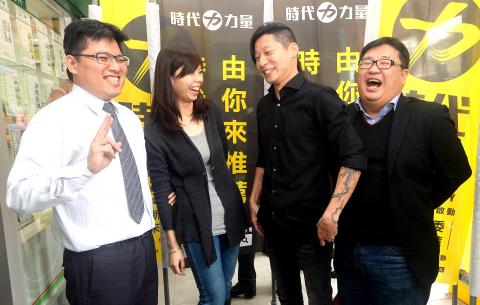The New Power Party (NPP) yesterday kept to its promise to bring fresh faces to next year’s legislative elections by adding two more political newcomers to its list of candidates — Freddy Lim (林昶佐) and Hung Tzu-yung (洪慈庸).
Hung, 32, gained national recognition after the 2013 death of her brother — army corporal Hung Chung-chiu (洪仲丘) — triggered an avalanche of protests demanding better protection of human rights in the military, while Lim, 39, is the lead vocalist of heavy metal band Chthonic and former chair of Amnesty International’s Taiwan chapter.
The duo announced their candidacy at a small breakfast store in Taipei yesterday morning to symbolize their belief that politics “should not be viewed as something distant and removed from our everyday lives.”

Photo: Lin Cheng-kung, Taipei Times
“Ever since my brother’s incident, we have been helped by many people who stood with us on our quest for fairness and justice,” Hung Tzu-yung said, adding that as a political outsider, she initially struggled with her decision to enter politics.
“It is my hope that whenever we encounter difficulties, we will not bow to fate or give up easily,” she added.
Hung Tzu-yung won praise for her leading role in the campaign following the death of her brother, in which she led more than 200,000 protesters in a march to demand more transparency in the military’s investigative efforts.
Their decision pits Hung Tzu-yung against Chinese Nationalist Party (KMT) Legislator Yang Chiung-ying (楊瓊瓔) in Taichung’s third electoral district — which includes the city’s northern Tanzi (潭子), Daya (大雅), Shengang (神岡) and Houli (后里) districts, while Lim is set to challenge KMT Legislator Chiang Nai-hsin (蔣乃辛) in Taipei’s Daan District (大安).
Despite Daan’s reputation as a KMT stronghold, Lim said that his decision to run there came “naturally,” as he was born and raised in the area.
Amid an explosion of candidates from minor parties entering the race, Lim could find himself competing for votes with the Social Democratic Party’s (SDP) Fan Yun (范雲), a professor of sociology at National Taiwan University, who is reportedly considering running in Daan.
The launch of two activist parties — the SDP and the NPP — was the result of a split in civic group Taiwan Citizen’s Union, after its members encountered irreconcilable differences regarding its legislative nomination mechanism.
Academia Sinica researcher Huang Kuo-chang (黃國昌), who played a leading role in the Sunflower movement protests last year, said that he fully supported the NPP’s cause of pursuing reform in the legislature.
Huang said the two latest NPP candidates showed courage, as they differed from many local candidates who received backing from local “political dynasties” or large business conglomerates.
According to a report by the Liberty Times (the Taipei Times’ sister paper) last month, Hung Tzu-yung’s uncle, Hu Shih-ho (胡世和), is also considering running as an independent in New Taipei City’s Sinjhuang District (新莊).
Lim and Hung Tzu-yung’s decision to enter the race followed on the heels of human rights lawyers Hu Po-yen (胡博硯) and Chiu Hsien-chih (邱顯智) — both attorneys in the Hung Chung-chiu case — who announced their decision to run on the NPP ticket last week.

Taiwan is stepping up plans to create self-sufficient supply chains for combat drones and increase foreign orders from the US to counter China’s numerical superiority, a defense official said on Saturday. Commenting on condition of anonymity, the official said the nation’s armed forces are in agreement with US Admiral Samuel Paparo’s assessment that Taiwan’s military must be prepared to turn the nation’s waters into a “hellscape” for the Chinese People’s Liberation Army (PLA). Paparo, the commander of the US Indo-Pacific Command, reiterated the concept during a Congressional hearing in Washington on Wednesday. He first coined the term in a security conference last

Prosecutors today declined to say who was questioned regarding alleged forgery on petitions to recall Democratic Progressive Party (DPP) legislators, after Chinese-language media earlier reported that members of the Chinese Nationalist Party (KMT) Youth League were brought in for questioning. The Ministry of Justice Investigation Bureau confirmed that two people had been questioned, but did not disclose any further information about the ongoing investigation. KMT Youth League members Lee Hsiao-liang (李孝亮) and Liu Szu-yin (劉思吟) — who are leading the effort to recall DPP caucus chief executive Rosalia Wu (吳思瑤) and Legislator Wu Pei-yi (吳沛憶) — both posted on Facebook saying: “I

Sung Chien-liang (宋建樑), who led efforts to recall Democratic Progressive Party (DPP) Legislator Lee Kun-cheng (李坤城), was released on bail of NT$80,000 today amid outcry over his decision to wear a Nazi armband to questioning the night before. Sung arrived at the New Taipei District Prosecutors’ Office for questioning in a recall petition forgery case last night wearing a red armband bearing a swastika, carrying a copy of Adolf Hitler’s Mein Kampf and giving a Nazi salute. Sung left the building at 1:15am without the armband and covering the book with his coat. Lee said today that this is a serious

Firefighters are working to put out a fire on Taipei’s Yangmingshan (陽明山) reported earlier this morning. The cause of the fire is still under investigation. The Taipei Fire Department said it received a report of a fire at Xiaoyoukeng (小油坑) at 11:17am, dispatching four command vehicles, 16 firetrucks, one ambulance and 72 personnel. The fire is still burning on about 250m² of land, according to initial estimates, as eyewitnesses reported seeing smoke rising from the mountain. The Yangmingshan National Park Headquarters on Facebook said the Qixingshan (七星山) hiking trail starting from Xiaoyoukeng and the Xiaoyoukeng parking lot are closed as firefighters work to put